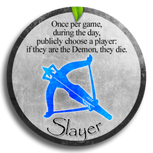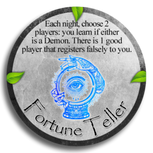
Blood on the
Clocktower
5-20 players
Duration: 30-120 Minutes
Age: 13+
Designer: Steven Medway
Publisher: The Pandemonium Institute
Artist: Micaela Dawn, Aidan Roberts, John Van Fleet, Grace VanFleet
Our rating: 10/10
Description from the publisher:
In the quiet village of Ravenswood Bluff, a demon walks amongst you...
During a hellish thunderstorm, on the stroke of midnight, there echoes a bone-chilling scream.
The townsfolk rush to investigate and find the town storyteller murdered, their body impaled on the hands of the clocktower, blood dripping onto the cobblestones below.
A Demon is on the loose, murdering by night and disguised in human form by day. Some have scraps of information. Others have abilities that fight the evil or protect the innocent. But the Demon and its evil minions are spreading lies to confuse and breed suspicion.
Will the good townsfolk put the puzzle together in time to execute the true demon and save themselves? Or will evil overrun this once peaceful village?
Gameplay Overview
Blood on the Clocktower is a bluffing game which plays 5 to 20 players who act as opposing teams of Good and Evil. If good, you win if when the Demon is dead. If evil, you win when only two players are left alive.
Each night, the Demon can select a player to die, and likewise at the end of each day, the town may execute a single player. Like most social deduction games, evil players know their co-conspirators are whereas the good players do not.
During the 'day' phase players can speak openly, communicating any information they believe to be useful, . Alternatively players might choose to whisper privately to trade information or spread lies culminating in a player's execution if a majority suspects them of being Evil. During the 'night' phase, players close their eyes and are woken one at a time by the Storyteller to gather information, or kill.
Each game is overseen by a Storyteller player who conducts the actions and makes crucial decisions that will lead the narrative.The Storyteller uses the game's intricate playing pieces to guide them through each game, leaving others free to play without a table or board. Even once a player is killed or executed, they stay in the thick of the action, haunting Ravenswood Bluff as ghosts trying to win from beyond the grave.
The tension and excitement builds for everyone as the bodies of victims pile ever higher... will Evil triumph or will Good save the day?

Blood on the Clocktower really is a bluffing Game Like No Other...
-
All players are in it for the entire game, staying on as influential ghosts even if their characters die!
-
If you arrive late to a game or need to leave before a game ends, you can become what is known as a Traveller character. These characters are equipped with high powers, with unusual talents and questionable allegiances.
-
There are currently three main scripts in the game Trouble Brewing, Bad Moon Rising and Sects and Violets. These are composed of the roles that the designers thought went well together, There is however a tool on the Blood on the Clocktower website which allows for you to build your own scripts and mix up the game however you wish.
-
Drunkenness, madness, and the odd poisoning are common in Ravenswood Bluff. With these unique features you can never trust anyone completely, not even yourself.
-
The most dynamic moderator role of any bluffing game – the Storyteller decides how to help, hinder, or mislead each team to craft a nail-biting experience each time.
-
The Storyteller can even assume the role of a special fabled character, each one with its own effect to dramatically change the flavour of a game.
-
In Blood on the Clocktower there are over 200 individual characters across seven planned editions, each with their own special ability. No two players in a game are ever the same character and no two games are ever alike!
The image to the left shows the script for the "Trouble Brewing" script, this is recognised as the easiest version of the game and is recommended as the best for learning and teaching the basics of the game.
Blood on the Clocktower at UK Games Expo
Blood on the Clocktower was absolutely one of the highlights of UK Games Expo for us. We were lucky enough to play 3 games over the course of the weekend.
After hearing about so much about Blood on the Clocktower for 6 months prior to UK Games Expo it was at the very top of our wish list to try at the expo. When the doors opened on Friday the first thing we did was head straight to their stand to sign ourselves up for a game later that day. After playing we were instantly hooked! Straight away we put ourselves down for another game later that evening.
We played two standard 9 player games in the expo halls and one epic 16 player game in the Hilton on Friday evening, The sweet spot for Blood on the Clocktower is around 8-13 players. A 9 player game takes around an hour to play whereas the 16 player game was a 2 and a half hour extravaganza.
The Blood on the Clocktower team at UKGE we’re an absolute joy. Ted our wonderful storyteller in the three games that we played was spectacularly helpful and allowed us to sit in on a couple of other sessions so that we could experience and see the game played out from the storytellers point of view.
So, what did we think of the game?
Blood on the Clocktower puts its self a head and shoulders above all other social deduction games in its sophistication, replay-ability and depth of strategy. The number of playable roles in this game alone is simply astounding, meaning that no game you play will ever be the same. How often can that be said?
The wonderful thing about this game that makes it stand out from other social deduction games is the vastness of it, There are so many different types of characters all with their own unique abilities and powers. There are a range of different Demon characters on each script.
Picture in your mind a game of Werewolf, you have your group of villagers with various special abilities and then you have your werewolf/ werewolves. They awake in the night and their power is to simply kill a person, your job is to work out who they are.
Now imagine this, there is a Demon in your midst but you know neither who they are or what kind of Demon they are...
Will it be the troublesome Imp? Who's task is simply to kill one player each night if they are left with , but wait, there's a twist... should they wish to sacrifice themselves one their minions may their place as the Imp to continue the evil plot to take down the village.
Are you playing with the tricksy Vortox who in the night awakes and kills a person of their choice. But who's presence causes all good players to yield false information. Get stuck in a game with this tricky Demon and if you don't execute at least one person per day they automatically win.
What about the fearsome Shabaloth? The Shabaloths ability allows them to kill two players during the night phase. Though those tricky good players can be hard to swallow and the Shabaloth may regurgitate a player they have just attacked.
Or could it be the dreaded Zombuul who only kills when there have been no executions in a day. The first time they are killed they register as dead but in fact are still alive.
This adds so much depth to the social deduction aspect of the game, first trying to determine a pattern so that you can work out which kind of demon you are playing with and them moving on to investigate which player you think that might be. So many other social deduction games don't do this and offer only one static 'traitor' role/ ability.
Blood on the Clocktower also does what so many other social deduction games fail to do; it creates a conversation. In other social deduction games players often hold back unsure of what they should say or share with the group. In Blood on the Clocktower however, a couple of the players on the good team are presented with information in the very first night which they can straight away share with the group as a whole. This starts the conversation moving right off the bat and from there discussion flows forwards.
For those that might have trouble bluffing as a traitor character in a standard social deduction game Blood on the Clocktower has the perfect set up to help, in the first night the Demon is presented with 3 tokens which show that player roles which currently aren't in play. This provides them with the perfect opportunity to bluff as one of those characters meaning that there will be no duplication of roles that might cause that person to immediately plummet into suspicion.
For those that are still unsure there is always the option to come away from the circle and speak to the storyteller who is always on hand to offer helpful advice to any of the players that might need it,
Blood on the Clocktower creates such a rich and immersive experience that in each of the games we played, we found ourselves so engaged that we barely noticed that almost an hour had passed as we reached the final day.
Somehow the experience doesn’t even stop there. Blood on the Clocktower will have you reminiscing about games you’ve played for hours or even days after you played them. Agonising over decisions made, rejoicing at joint victories or questioning what what would have happened if...?
Now we find ourselves with only one question left on our lips... When can we play again?!!



























